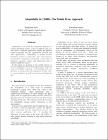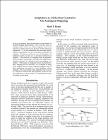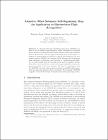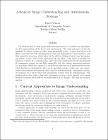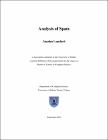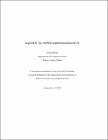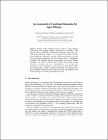Browsing Computer Science Technical Reports by Title
Now showing items 1-20 of 280
-
Ad-hoc Internet Connectivity
(Trinity College Dublin, Department of Computer Science, 2003-05-28)For a large class of wireless networks connectivity to fixed services such as the internet will be essential. However, since nodes in a wireless network are mobile, their point of connectivity to a fixed network may be ... -
Adaptability in CORBA: The Mobile Proxy Approach
(Trinity College Dublin, Department of Computer Science, 2000-12)Adaptability is one of the most important challenges in modern distributed systems. It may be defined as the ease with which a software application satisfies the different system constraints and the requirements of users ... -
Adaptation as a Selection Constraint On Analogical Mapping
(Trinity College Dublin, Department of Computer Science, 1993-12)In any given analogy, there are potentially a large number of possible mapping interpretations. One of the key issues in analogy research is how one of these mappings comes to be selected as optimal and used as the basis ... -
Adaptive Offset Subspace Self-Organizing Map: An Application to Handwritten Digit Recognition
(Trinity College Dublin, Department of Computer Science, 2006-06-23)An Adaptive-Subspace Self-Organizing Map (ASSOM) can learn a set of ordered linear subspaces which correspond to invariant classes. However the basic ASSOMcannot properly learn linear manifolds that are shifted away ... -
Adaptive Ontology-Driven Personalised News Services
(Trinity College Dublin. Department of Computer Science, 2005-09)Ontologically Driven Adaptation is a challenging field within the area of Personalised News. Ontologies provide a structured, semantically rich methodology for the modelling of a domain. Personalised News is an area of ... -
An Adaptive Web-Based Learning Environment
(Trinity College Dublin. Department of Computer Science, 2000-09)In recent years enormous progress has been made in World Wide Web technologies. This is making the web an even more promising way to deliver educational material. New Technology, integrated with experiential education, can ... -
An Advanced Appliance Interaction Architecture
(Trinity College Dublin. Department of Computer Science, 2005-09)In the future, the ability to monitor and control home appliances over the Internet could become one of the conveniences that we wonder how we ever managed without. Also, the ability to interact with networked appliances ... -
Advanced Image Understanding and Autonomous Systems
(Trinity College Dublin, Department of Computer Science, 1992-03)The ultimate goal of most image understanding systems is to produce an unambiguous 3-D representation of the local visual environment. This representation can then be employed by robotic systems to effect some meaningful ... -
Agent Mediated Collaborative Web Page Filtering
(Trinity College Dublin, Department of Computer Science, 1998-07)Intelligent filtering of multimedia documents such as World Wide Web (WWW) pages is an extremely difficult task to automate. However, the determination of a page?s relevance to one?s interests is a skill that comes ... -
AI Structuralist Storytelling In Computer Games
(Trinity College Dublin, Department of Computer Science, 2004-10)This paper is a description of our work in creating a story director agent which utilises AI techniques. The story director controls the storyline in an adventure computer game, with the player controlling the hero ... -
Amadeus Installation and Maintainence Guide
(Trinity College Dublin, Department of Computer Science, 1992-02)The installation and maintainence of an Amadeus system is described. -
Analogical Asides on Case-Based Reasoning
(Trinity College Dublin, Department of Computer Science, 1994-09)This paper explores some of the similarities and differences between cognitive models of analogy and case-based reasoning systems. I first point out a paradox in the treatment of adaptation in analogy and in case-based ... -
An Analysis of Case-Base Editing in a Spam Filtering System
(Trinity College Dublin, Department of Computer Science, 2004-08)Because of the volume of spam email and its evolving nature, any deployed Machine Learning-based spam filtering system will need to have procedures for case-base maintenance. Key to this will be procedures to edit ... -
Analysis of Spam
(Trinity College Dublin. Department of Computer Science, 2003-09)Spam is a pervasive annoyance in the lives of the Internet user. It has exploded into all facets of communications from mobile phones to personal organisers, and it has become a topical subject of discussion due to recent ... -
Aontas: The CaberNet Technical Abstracts Service
(Trinity College Dublin, Department of Computer Science, 1995-10)CaberNet is the ESPRIT network of excellence in distributed systems consisting of several European research groups. CaberNet has industrial affiliates who receive regular information about the research activities of ... -
The Application of Case-Based Reasoning to Early Software Project Cost Estimation and Risk Assessment
(Trinity College Dublin, Department of Computer Science, 2000-02)In this paper we assess the applicability of case-based reasoning to the difficult problem of early software project cost estimation. We conclude that a comprehensive case representation is not available early in the ... -
An Approach to Aggregating Ensembles of Lazy Learners that Supports Explanation
(Trinity College Dublin, Department of Computer Science, 2002-04)Ensemble research has shown that the aggregated output of an ensemble of predictors can be more accurate than a single predictor. This is true also for lazy learning systems like Case-Based Reasoning (CBR) and ... -
Architecture for multi-party synchronization of data sets in a distributed environment
(Trinity College Dublin. Department of Computer Science, 2005-09)In the world of common mobility, where more and more people and organizations use various mobile equipment such as phones, personal data assistants and other devices the consistency of stored and exchanged data is a very ... -
AspectC#: An AOSD implementation for C#
(Trinity College Dublin. Department of Computer Science, 2002-09)A major problem with Object Oriented Programming (OOP) is that it cannot deal efficiently with crosscutting concerns. Aspect Oriented Software Development (AOSD) is a new methodology that tries to enable the extension ... -
An Assessment of Case-Based Reasoning for Spam Filtering
(Trinity College Dublin, Department of Computer Science, 2004-11)Because of the changing nature of spam, a spam filtering system that uses machine learning will need to be dynamic. This suggests that a case-based (memory-based) approach may work well. Case-Based Reasoning (CBR) is a ...





